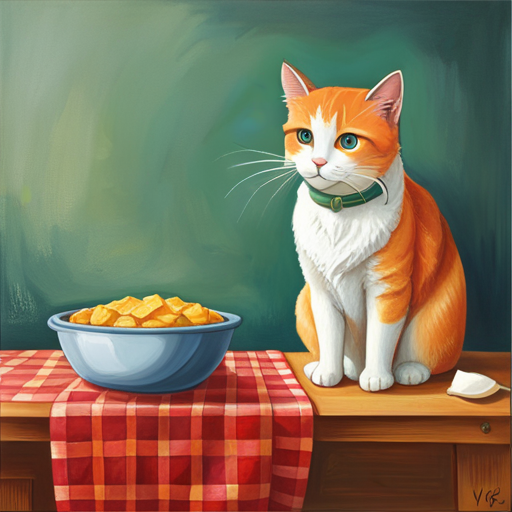Interestingly, over 90% of adult cats are lactose intolerant, a statistic that might make you reconsider sharing your dairy snacks with your feline friend.
You’ve probably wondered if that spoonful of ricotta cheese you’re tempted to offer is safe for your cat. Ricotta, with its creamy texture and mild flavor, seems harmless enough, but the reality of how it affects your cat’s health is more complex than you might think.
Without giving everything away just yet, let’s say there’s a fine line between a harmless treat and a potential health risk. Stick around to uncover the nuances of feeding ricotta cheese to cats.
Key Takeaways
- Ricotta cheese may be safe for some cats but consider individual lactose tolerance.
- Over 90% of adult cats are lactose intolerant, potentially causing digestive issues.
- Ricotta’s high whey protein content can offer nutritional benefits for cats.
- Always introduce dairy like ricotta in small amounts to monitor for adverse reactions.
Understanding Cat Nutrition
To ensure your cat’s health and vitality, it’s crucial to grasp the fundamentals of feline nutrition. Cats are obligate carnivores, meaning their bodies are finely tuned to derive nutrients from animal-based proteins. Protein sources, such as meat, fish, and poultry, provide essential amino acids that your cat’s body can’t produce independently. These amino acids are vital for maintaining muscle mass, supporting a healthy immune system, and facilitating various metabolic processes.
Equally important to a cat’s diet is hydration. While cats have evolved to obtain most of their water intake from their prey in the wild, domestic cats often need encouragement to drink water. This is especially true for those fed primarily dry food diets. Proper hydration aids in digestion, helps flush toxins from the body, and supports kidney health. Therefore, ensuring your cat has access to fresh, clean water at all times is non-negotiable.
Lactose Intolerance in Cats
You must understand that lactose intolerance is common in adult cats due to a decrease in lactase, the enzyme required to digest lactose found in dairy products.
This variability in lactose tolerance among felines significantly impacts their digestive health. Consequently, introducing ricotta or any dairy product into your cat’s diet requires careful consideration of their individual lactose tolerance.
Cats’ Digestive Health
Many cats, being lactose intolerant, struggle to digest dairy products like ricotta cheese efficiently. This condition primarily stems from their decreased ability to produce lactase, the enzyme necessary for breaking down lactose found in dairy. Without adequate lactase, lactose remains undigested, leading to uncomfortable symptoms like diarrhea and bloating.
To support your cat’s digestive health, consider integrating hairball remedies and digestive enzymes into their diet. Hairball remedies can aid in the smooth passage of ingested fur through the gastrointestinal tract, reducing the risk of blockages. Supplementing with digestive enzymes can also enhance nutrient absorption and improve overall digestion, making it easier for your cat to process a variety of foods more effectively, even in the presence of lactose intolerance.
Lactose Tolerance Variability
While most cats exhibit lactose intolerance due to a decrease in lactase production as they age, the degree of intolerance varies significantly among individuals. This variability often stems from genetic factors that influence how a cat’s body processes lactose throughout its life.
You’ll find that some cats might digest dairy products with minimal issues, while others experience immediate digestive distress. Age-related changes further complicate this picture. Kittens usually produce more lactase, the enzyme necessary for breaking down lactose, making them more tolerant of milk.
However, as cats grow older, their lactase production typically declines, rendering most adult cats lactose intolerant to varying degrees. Understanding your cat’s specific lactose tolerance can help you make informed dietary choices for them.
The Composition of Ricotta Cheese
Ricotta cheese comprises primarily whey protein, a by-product of cheese production, offering a rich profile of essential amino acids. This aspect of its nutritional value is crucial as it contributes significantly to a balanced diet, providing the building blocks for muscle repair and growth. It’s essential to understand that during cheese production, the whey is separated from the curd, and it’s this whey that’s used to make ricotta. This process ensures that ricotta retains a high concentration of proteins.
Moreover, ricotta is also notable for its content of vitamins and minerals, including calcium, vitamin B12, zinc, and selenium. These nutrients play an indispensable role in maintaining bone health, supporting the immune system, and aiding in metabolic processes. The fat content in ricotta, predominantly saturated fats, is relatively low compared to other cheeses, making it a lighter option.
It’s this unique composition that makes ricotta a noteworthy consideration in the context of nutritional value. The combination of high-quality protein, essential vitamins, and minerals underscores its potential benefits. However, when thinking about introducing ricotta or any new food into your cat’s diet, it’s vital to proceed with caution and be informed about all aspects of its nutritional profile.
Potential Health Risks
Despite its nutritional benefits, it’s crucial to understand that ricotta cheese may pose health risks to cats, particularly due to its lactose content and fat composition. While some cats can tolerate lactose in small amounts, many are lactose intolerant. This means their digestive system lacks the enzymes needed to break down lactose, leading to potential digestive discomfort such as diarrhea and vomiting. It’s essential to observe your cat’s reaction to dairy products and consider these potential adverse effects.
Moreover, ricotta cheese, being rich in fats, can lead to weight gain in cats if consumed in significant amounts. Obesity in cats is a growing concern and can precipitate a host of health issues, including diabetes, liver problems, and joint stress. It’s imperative to monitor your cat’s diet closely and ensure they’re getting a balanced diet tailored to their specific needs.
Allergic reactions, though less common, can also occur. Some cats may exhibit signs of an allergic reaction to the proteins found in cow’s milk, from which ricotta is made. Symptoms can include itching, swelling, and gastrointestinal upset. If you notice any of these symptoms after feeding your cat ricotta cheese, it’s advisable to discontinue its use immediately and consult your veterinarian.
Safe Feeding Practices
To ensure your cat’s safety and health, consider introducing ricotta cheese into their diet in minimal, controlled amounts, if at all. While ricotta cheese can be a source of protein and calcium, it’s crucial to remember that cats have specific dietary needs that differ significantly from humans. Their bodies aren’t designed to handle dairy products well, leading to potential digestive issues.
Feeding frequency plays a critical role in safe feeding practices. It’s advisable to treat ricotta cheese as an occasional treat rather than a regular part of their diet. A good rule of thumb is to offer it no more than once a week, ensuring it doesn’t disrupt their nutritional balance.
Portion control is equally important. When you do decide to give your cat ricotta cheese, keep the portions small. A teaspoon is ample for them to enjoy the taste without overwhelming their digestive system. Always monitor your cat for any adverse reactions after introducing new foods, including ricotta cheese, into their diet.
Alternatives to Ricotta Cheese
If you’re exploring safer dietary options for your cat, several nutritious alternatives to ricotta cheese are available that better cater to their unique nutritional requirements. While cheese can be a tempting treat, it’s not always suitable for cats due to lactose intolerance and the potential for unhealthy weight gain. Instead, consider these cheese substitutes that offer better nutritional comparisons for your feline friend:
-
Cooked, Unseasoned Chicken: High in protein and low in fat, making it an excellent choice for muscle growth and energy.
-
Canned Tuna or Salmon in Water: Offers omega-3 fatty acids which are beneficial for your cat’s coat and skin health. Ensure it’s in water, not oil, and lacks added salt.
-
Pumpkin Puree: A good source of fiber, aiding in digestion. Ensure it’s pure pumpkin, not the spiced pie filling.
-
Cooked Eggs: Provide a high-quality source of protein and essential amino acids. Ensure they’re cooked thoroughly to avoid the risk of salmonella.
These alternatives not only meet the nutritional needs of your cat but also minimize the risk of digestive issues and unhealthy weight gain. By choosing these options, you’re ensuring a balanced diet that supports your cat’s health and well-being.
Conclusion
In the cozy warmth of your kitchen, you may wonder if sharing a bit of ricotta cheese with your feline friend is safe. While the allure of their soft purrs might tempt you, remember, cats’ delicate systems aren’t designed for dairy.
Ricotta, although lower in lactose, still poses risks and can lead to discomfort or more severe health issues. It’s best to stick to cat-specific treats that cater to their carnivorous needs, ensuring they remain the vibrant, playful companions we cherish.

